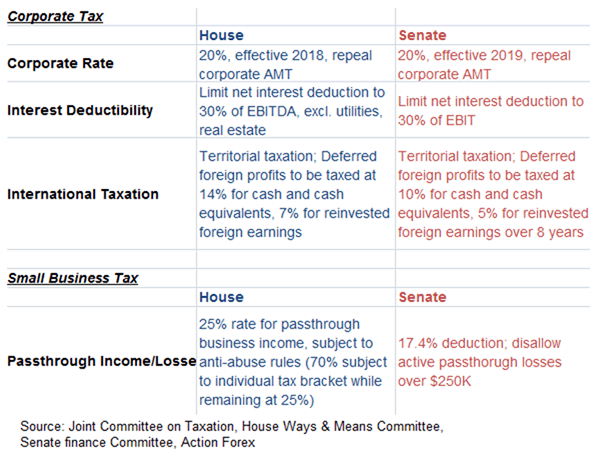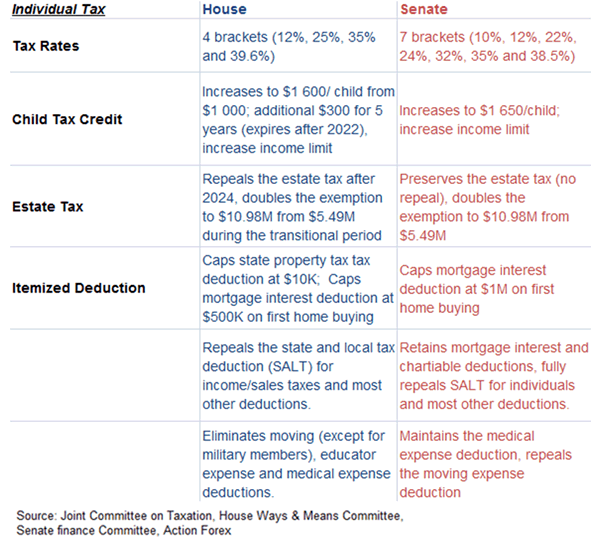The House of Representatives passed its version of tax reform bill with a 227-205 vote. The outcome had been widely anticipated as Republicans control 240 out of 435 seats there. Despite the passage of the bill, there were 13 Republicans voted against it due to the dissatisfaction with the proposal to eliminate the deduction for state and local income taxes, although the deduction for property tax up to US$ 10 000 is preserved. Dissenters were mainly from high-tax states with 5 GOPs from New York, 4 from New Jersey, 3 from California and 1 from North Carolina voting against the bill. The House is presumably the easier hurdle for the tax reform bill due to the larger Republican majority.
A biggest barrier lies in the Senate. Currently controlling 52 out of 100 seats, the Republicans cannot lose more than two votes in the Senate. Making the situation more complicated are the record budget deficits, the need to raise or further suspend the debt ceiling by December 8 and the notable differences between the House and Senate tax bill.
Record Budget Deficit
Last month, the Treasury Department reported that budget deficit rose +US$ 80B billion to US$ 666B in fiscal 2017. The deficit as a percentage of GDP also increased to +3.5% from 3.2% last year. The tax reform plan, predominately tax reduction, would only add burden to swelling deficit. Indeed, the Congressional Budget Office (CBO) and the Joint Committee on Taxation estimated that the House version of tax plan would add US$ 1.7 trillion to federal deficits over the coming decade, exceeding the US$ 1.5 trillion increase allowed under the procedural rules (the House suggested that it would be below US$ 1.5 trillion, though).
Debt Ceiling
On September 7, the Senate approved a bill to raise the debt limit and keep the government funded until December 8. The bill came together with a provision of US$ 15B financial assistance to those affected by hurricanes. Interestingly, the legislation was passed with 80-17 vote in the Republican-controlled Senate and all "no" voters were Republicans. The only reason is that the deal was done between Trump and the Democrats!
Following the House’s vote, the Senate hopefully would vote before Thanksgiving (November 23). Yet, it is possible for the Senate to delay it until the issue of debt ceiling and government shutdown are resolved, i.e. after December 8! In the upcoming debt ceiling negotiation, we expect Trump would again demand funds for US-Mexico border wall while Democrats reiterate the request on Obamacare subsidies. The task this time would be more difficult than two months ago as no humanitarian matter (emergency funding) is attached to the bill.
House and Senate Bill
The contentious points lie on areas such as the start date for corporate tax rate cut, individual tax brackets, mortgage interest, and state and local tax deductions (SALT). The following table summarizes the major differences between the House and Senate plans. On corporate tax, the House’s plan proposes to cut the statutory rate, currently at 35%, to 20%, effective on January 2018. However, the Senate’s plan proposes the reduction to take effect one year later, i.e. January 1, 2019. The delay is estimated to save government revenue by about US$ 130B. Some suggest that both sides could compromise on a phase-in plan, e.g. cutting the tax rate to 30% next year and eventually reaching the 20% rate by 2020. Meanwhile, while the House proposes to limits net interest expense deductibility to 30% of earnings before interest, taxes, depreciation, and amortization (EBITDA), the Senate suggests that the calculation should be earnings before interest and taxes (EBIT) instead.

On individual tax, the House version proposes to reduce the number of tax brackets from 7 to 4 (12%, 25%, 35% and 39.6%) while the Senate version suggests to keep the number at 7 with the rates at 10%, 12%, 22%, 24%, 32%, 35% and 38.5%. Meanwhile, the House proposes to expand the child tax credit to US$ 1 600 with additional credit of US$ 300 for 5 year, whereas the Senates proposes to expand the credit to US$ 2 000 without additional credit. The House proposes to double the estate/gift tax exemption before eventual elimination of estate tax after 2024. However, while the Senate agrees to double the exemption, it objects to repeal it entirely. On mortgage interest rates, the House proposes to allow deduction of interest on the first US$ 550K of mortgage, while the Senate hopes to maintain the status quo – deduction of interest on the first US$ 1M of mortgage. On SALT, the House bill proposes to repeal the deduction for state and local income taxes or sales taxes, while preserving the deduction for state and local property taxes, capped at US $10K. Yet, the Senate would like to fully repeal the deduction for all state and local taxes.

Time is NOT on the Republicans’ Side
Rigorous debates are anticipated before any compromise is reached. Uncertainties are high. Yet, we believe much of the compromise would be made in favor of the Senate version, given the eagerness for the Republicans to get the reform done. The low and deteriorating popularity of Trump, recent Democratic election victory in New Jersey and Virginia and concerns about losing the Senate special election in Alabama have raised pressure of the Republicans to "achieve" something, or it would risk lose the House majority in the midterm election next year. If that’s the case the growth-boosting effect of final tax plan would certainly be less prominent than previously anticipated.
